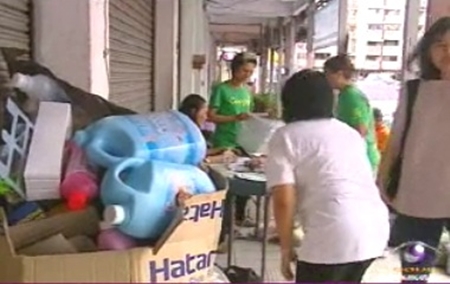They say one man’s trash is another man’s treasure. People in a Bangkok community decided to turn trash in their neighbourhood into treasure. Their collaboration led to the opening of the so-called “Zero Baht” shop.
You may walk into this shop at the Din Daeng housing estate with an empty pocket but it’s not necessary you walk out empty-handed. It’s possible you leave the shop with some goods for your daily use without having to pay a single penny.

“Your contribution to society can be two ways at the same time. You can save the world and save money in your pocket. Come to our shop and join our activity. Correctly sort out garbage in your house and you’ll get money in return for them, said Chatsanan Masawangpairoj, the manager of Ruam Mitr Project.
The Zero Baht shop was set up by residents of Din Daeng housing estate joining hands with the private and state sectors. It started with a garbage bank 2 years ago when residents deposited their reusable garbage. There are currently 2 garbage banks in Bangkok, each having about 150 members.
First, a resident must open an account with the garbage bank. He has to thoroughly clean garbage items such as plastic bottles, sturdy plastic bags, paper boxes, and soft drink cans, to be deposited at the bank in return for cash. The cash can be exchanged to coupons to buy recycled products at the shop.
Among the best-selling items are containers made from aluminium soft-drink cans. Demand for the product has rapidly increased, and the craftsmen are becoming more creative. They flatten the soft-drink cans into sheets so that customers assemble them into containers by themselves. The products are sold in Thailand and overseas, and their website is one of several marketing channels.
“People continue selling recycled trash to the garbage bank. When they see how we turn recycled garbage into attractive products, they come and learn from us,” said Nuanyai Lodnakorn
a specialist of the garbage bank.
“Product development is based on the availability of recycled garbage in each area. We help them with innovation so that their products are saleable in the market. We want them to make a living and develop the activity into a business,” said Supachai Namkiatskul from the Institute for Sustainable Packaging.
Now that the Zero Baht shop has proved successful, at least 12 more shops will be opened in Bangkok and other provinces.
With the network in full gear, the operators believe it can help recycle at least 15 million tonnes of garbage each year and definitely save lots of expense by eliminating part of the country’s mounting garbage.




